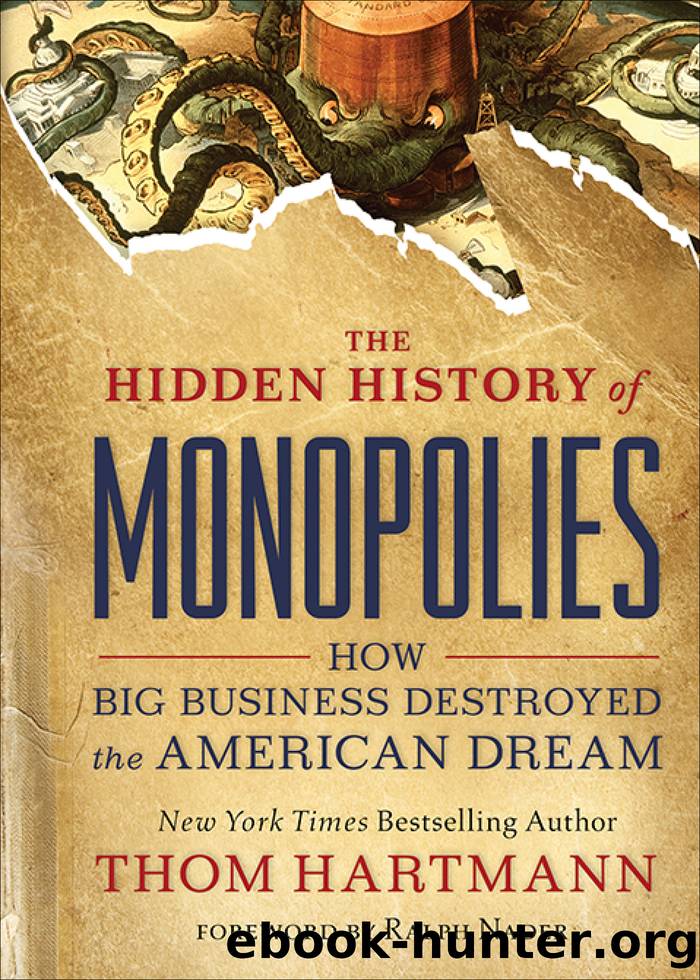The Hidden History of Monopolies by Thom Hartmann

Author:Thom Hartmann [Thom Hartmann]
Language: eng
Format: epub
Publisher: Berrett-Koehler Publishers
Published: 2020-08-24T16:00:00+00:00
Monopoly Is Anti-business
No matter how much Robert Bork and his colleagues say they’re “pro-business,” what they’re actually advocating is helpful only to a very small class of very large businesses and the very wealthy people who own them or their stock. Small and medium-sized businesses, entrepreneurs, workers, communities, and start-ups are badly damaged by the focus of antitrust law being kept entirely on prices that consumers pay.
Bork—and indeed his entire class of Chicago School economists—was always focused on the interests of straight, white, wealthy men to the exclusion of women, communities of color, and people who were not the “makers” and “job creators” of their lore.
Consistent with that focus, whether applied to micro- or macroeconomics, to regulating pollution or monopolies, to their complaints about “anti-war hippies” “urban dwellers,” or “women’s libbers,” Bork and his friends managed to insert into the political and economic bloodstream of our nation the cancer-causing virus of “greed is good” ideology. Its impact has been devastating.
In the decades prior to Reagan adopting Bork’s pseudoreligion of “freedom” for the biggest corporations and richest people, the working class was growing in economic and political power just as fast as the very wealthy. Post-Reagan, their power was stripped away, and trillions of dollars of working-class wealth have been redistributed to the top 1%.
Prior to Reagan adopting Bork’s notion of antitrust, there were twice as many public corporations as today, and local communities were rich with locally and family-owned businesses. Post-Reagan American towns and cities are frighteningly homogeneous, all their commercial activity having been subsumed by a handful of large national brands from groceries to gasoline to hotels to restaurants to retail.
Even niche businesses like investment advisers, car repair shops, insurance companies, hardware stores, and flower shops have been wiped out by giant national firms.
Although Reagan sold us Bork’s ideas as “pro-business,” in fact they were (and are) radically anti-business. By damaging the middle class, they’ve eviscerated what economists call “aggregate demand,” the wage-driven purchases made by working-class people that drive the economy, leading to a flattening of GDP growth decade over decade.
By damaging the ability of workers to unionize, Chicago School theories have torn apart communities of laborers who once worked hand-in-glove with business to achieve mutual success.
By allowing the virtual monopolization of industry after industry, Bork’s theories have decimated innovation and competition.
At their core, the way that America and, sadly, much of the rest of the world have adopted Chicago School theories has been deeply and profoundly anti-business and has badly damaged America’s small businesses and middle class.
Download
This site does not store any files on its server. We only index and link to content provided by other sites. Please contact the content providers to delete copyright contents if any and email us, we'll remove relevant links or contents immediately.
International Integration of the Brazilian Economy by Elias C. Grivoyannis(111064)
The Radium Girls by Kate Moore(12032)
Turbulence by E. J. Noyes(8054)
Nudge - Improving Decisions about Health, Wealth, and Happiness by Thaler Sunstein(7710)
The Black Swan by Nassim Nicholas Taleb(7134)
Rich Dad Poor Dad by Robert T. Kiyosaki(6639)
Pioneering Portfolio Management by David F. Swensen(6303)
Man-made Catastrophes and Risk Information Concealment by Dmitry Chernov & Didier Sornette(6022)
Zero to One by Peter Thiel(5804)
Secrecy World by Jake Bernstein(4754)
Millionaire: The Philanderer, Gambler, and Duelist Who Invented Modern Finance by Janet Gleeson(4481)
The Age of Surveillance Capitalism by Shoshana Zuboff(4301)
Skin in the Game by Nassim Nicholas Taleb(4252)
The Money Culture by Michael Lewis(4210)
Bullshit Jobs by David Graeber(4194)
Skin in the Game: Hidden Asymmetries in Daily Life by Nassim Nicholas Taleb(4009)
The Dhandho Investor by Mohnish Pabrai(3769)
The Wisdom of Finance by Mihir Desai(3750)
Blockchain Basics by Daniel Drescher(3584)
